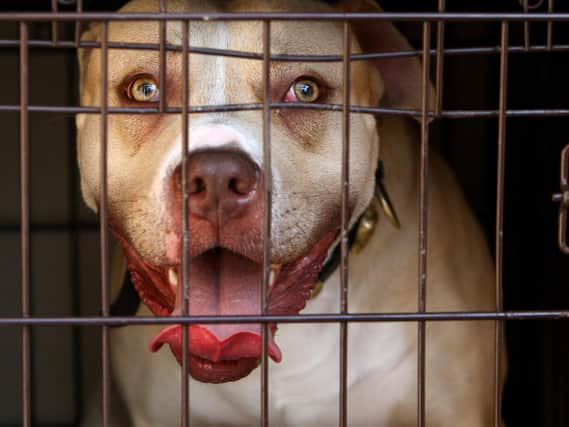Hundreds of people bitten by dogs in Preston, Chorley and South Ribble


There were 459 assaults in Chorley, Preston and South Ribble - but only 57 people were penalised, according to Lancashire Constabulary.
Crown Court judges can lock up irresponsible dog owners or supervisors for up to five years for dog bites, says a Preston legal expert. But most cases are first-time incidents and police often fail to prosecute them because victims cannot identify the culprit.
Advertisement
Hide AdAdvertisement
Hide AdCarrie Gilgun, partner in Forbes Solicitors’ crime team, said: “You can bring a criminal prosecution even if you only have reasonable belief a dog is going to injure you. It’s taken seriously and there aren’t many defences.


“You don’t have to prove the dog is dangerous day-to-day. But most incidents are difficult to prosecute because they occur when the offending dog is off lead and the owner or person in charge of them isn’t visible.
“They often deny what’s happened or leave immediately. The victim is focused on saving their pet or treating their injury instead of taking evidence or a picture of the other animal owner.
“I’d advise people to take a picture of the culprit when it is safe to do so, as they may become violent, and then contact the police immediately so that they can find them if they’re still in the area.”
Advertisement
Hide AdAdvertisement
Hide AdSome 269 of the total assaults in the last three years occurred in Preston, while there were 107 in South Ribble and 84 in Chorley. They fell by more than 10 per cent in Preston and just over five per cent in South Ribble during the same period but soared by around 50 per cent in Chorley.
Meanwhile, some 28 Preston pet-owners were penalised for irresponsible dog ownership, as were 24 in South Ribble, and five in Chorley. Prosecutions plummeted by more than 60 per cent overall and by 80 per cent in South Ribble.
Lancashire’s alarming figures reflect the national picture.
The NHS dealt with nearly 9,000 hospital admissions for dog attacks in the UK in 2018-19. There were 4,611 in 2007-8 but in 11 years this soared to 8,525.
Advertisement
Hide AdAdvertisement
Hide AdAdmissions have generally increased by at least around five per cent year on year, except for 2010-11 when they increased by three per cent and 2012-13 and 2016-17 when they decreased slightly.
Lancashire Teaching Hospitals NHS Foundation Trust saw around a seven per cent rise in admissions from 2014-15 to 2018-19, increasing from 150 to 160.
Under 9s make up the most victims nationally each year while over 70s are the least at risk.
Police can punish people for dog on human attacks by charging them with either non-aggravated or aggravated assault. The former only requires reasonable belief that injury could occur, such as snapping, while the latter involves bodily harm and carries a fine or an up-to-five-year jail sentence.
Advertisement
Hide AdAdvertisement
Hide AdIf prosecution succeeds, the court can order the offending dog to be destroyed.
But the owner can plead for a contingent destruction order, which means their pet will be put down if they breach any safety measures, such as muzzling, which are put in place to prevent further animal violence.
Civil complaints are theoretically easier to prove because an attack need not take place but evidence must show that the dog is dangerous day-to-day, says Carrie. Police can enforce an acceptable behaviour contract but there is no punishment for an owner who breaches the resulting safety measures. However, it can make non-aggravated criminal action easier to uphold.
A Lancashire Police spokesman said: “Any dog has the potential to be dangerous, especially around very small children, and dogs should always be supervised.
Advertisement
Hide AdAdvertisement
Hide Ad“All dogs should be in the charge of people capable of handling them. For large, powerful dogs, whether or not they are listed as dangerous, this should always be an adult.
“Since May 2014 the law has been extended to make it an offence for a dog to be dangerously out of control in all places, including inside the dog owner’s home – protecting people such as postal workers, health professionals and children. It is also now a specific offence to allow your dog to attack an assistance dog. Owners of dogs who attack can expect up to 14 years imprisonment if a person dies as a result of a dog attack; five years imprisonment if a person is injured by a dog attack and three years imprisonment if an assistance dog is either killed or injured.”
Councils deal with attacks on other animals and can enforce public spaces orders that require owners to follow any rules that local authorities deem necessary, with few defences. Dogs are not allowed in public children’s play areas, and should be kept on leads on roads, footways and grass verges.
“But you never see anyone enforcing these, so many people turn a blind eye. It’s difficult to cover wide areas like parks,” Carrie added.
Advertisement
Hide AdAdvertisement
Hide AdA spokesperson for Preston City Council says its environmental health team liaise closely with Lancashire Police to share information about aggressive dogs to help prevent incidents.
They added: “Within our remit we work with members of the public who notify us about aggressive dogs. Our Dog Control Technician will follow up with dog owners and provide advice to improve the behaviour of aggressive animals and tackle the cause of complaints. Where necessary we have a range of powers under anti-social behaviour legislation that can be utilised.
“Our officers have the power to serve Community Protection Notices on irresponsible dog owners and we can prosecute for a breach of these notices. They also have the power to seize aggressive animals should there be a court order to do so.”
Dr Samantha Gaines, the RSPCA’s Head of Companion Animals, says police and councils also struggle to fight against anti-social behaviour by animals because they are overstretched and underfunded.
Advertisement
Hide AdAdvertisement
Hide AdShe added: “Lots of antisocial behaviour problems are not easy to address because local authorities and the police don’t have the funds or time to tackle them or put in appropriate measures.”
Dealing with dog violence puts pressure not just on the police and council but also the NHS. Medical treatment for dog attacks costs the NHS an estimated £3 million per year, according to the study, Companion Animal Economics, developed by animal behaviour experts, Professor Daniel Mills and Dr Sandra McCune.
If you see a dog out of control, dial 999. For advice on whether you have one of the listed breeds, or to report a suspicious dog belonging to someone else, call the police on 101 or ring Crimestoppers. Strays should be reported to the local dog warden.